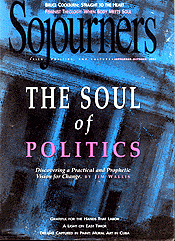
Magazine
Sojourners Magazine: September-October 1994
Subscribe to Sojourners for as little as $4.95!
Cover Story
Feature
Commentary
Labor Day is usually remembered more for the fun things you do on a day off than for the workers it honors.
Labor Day: Justice. Workers. Solidarity. Sweat of the brow. Sixteen tons and what do you get? Another day older and deeper in debt.
Or...Picnics. Beaches. Hot dogs. TV telethons.
Four women sit, faces buried deeply in their hands, visibly
anguished.
Imagine the situation if Jimmy Carter had not gone to
North Korea this summer, and if Kim Il Sung’s death had come
in the midst of a still-escalating crisis.
Indonesia’s brutal 19-year occupation of East Timor has caused the deaths of one-third of the island’s population—some 200,000 people—and shows no sign of letting up soon.
Columns
Rufina Amaya is one of the few survivors of the 1981 massacre in the Salvadoran village of El Mozote.
It’s hot. The yard needs mowing—the grass is so tall
I have to wear rubber boots in the morning dew.
As I yelled at Melissa and Gabriel for disobeying, a terrible contradiction flashed before me, but I beat it down, intent on winning this battle of wits.
I’m not sure why I turned on the television that Friday
night. Mountains stand between me and most airwaves, and my old
TV set tunes into only two channels.
People don’t always say what they mean (I meant to say
that). And this past summer brought several examples of the daily
"little white lies" we tell each other.
Culture Watch
Departments
DAVID BREMER and Ched Myers make the case ("The Flutter of History," July 1994) that Wim Wenders' films, especially "Wings of Desire" and "Faraway So Close," are profound theological meditations fr
ROSEMARY Radford Ruether’s eloquent article about the
ingrained fallibilities of the organized church ("Why I Stay
in the Church," July 1994) warns us that when we think we
can encompass Go
"I am mooring my rowboat
at the dock of the island called God."
—Anne Sexton
The Awful Rowing Toward God
Every so often, movements and communities, churches and societies (and individuals), need to pause and assess who they are and how to move forward. Hard questions must be asked.
AFTER READING THE excellent article "Faithful to the
Word," by William Stringfellow, I found recognizable
Christian theology on the pages of my Sojourners.
Tragically, the preponderance o
In September the ordered world of Proverbs and James is read
against the cross of Mark’s world.
The value of a faith-based community in children’s lives
cannot be overestimated.
THE FEATURE ARTICLES IN the July 1994 issue on "Why I
Stay in the Church," by Rosemary Radford Ruether and Richard
Rohr, while providing many insights, were not real helpful.
WHEN CHRIST DIED on the cross, the veil of the temple was torn
from top to bottom.
REFERRING TO JULIE Polter’s Commentary, "Ending
Welfare as We Know It," in your July 1994 issue, I’m
disappointed that no one seems to be focusing on one very basic
flaw in the current
I’LL BET YOU HEAR from a lot of old Student Christian
Movement types who recognized the Robert Hodgell woodcut print on
page 19 of the July 1994 issue, labeled "Artist
unknown." In the